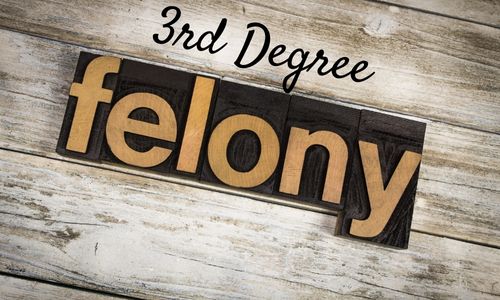Third Degree Felony in Florida
What is A Felony?
The definition of a felony is an offense that could be punishable by prison time. Felonies are categorized in terms of degrees; first degree, second degree and third degree. While some states use other categorizations; Class A felonies, Class B felonies, etc., in the state of Florida actionable offenses are rated by degrees.
If capital and first-degree offenses are reserved for the most serious crimes, third degree felonies constitute the lowest possible categorization for a criminal offense that could lead to a possible prison term. 
What Crimes Constitute a Third-Degree Felony in Florida?
There are a variety of crimes that are considered felony offenses in the state of Florida. These crimes include both violent and non-violent offenses.
- Grand Theft
- Drug Possession Charges
- Drug Trafficking
- Burglary of a Structure
- Battery on a Law Enforcement Officer
- Resisting Officer with Violence
- Murder
- Kidnapping
- Rape and other sex crimes
- Carjacking
Key considerations for categorization of crimes include, not just physical injury as is the case in violent offenses like felony battery, but also lasting emotional harm like domestic violence, and crimes against the community, as is the case in fraud and embezzlement cases.
In examples like drug trafficking and sex crimes including rape, there is both immediate and community harm, thus these offenses would rise to the level of felony crimes. There really is no hard and fast rule to the categorization of crimes according to the degree system. Some offenses are clearer cut and more defined than others.
Consequences of a Third-Degree Felony Conviction
A felony conviction is something that will follow a person throughout their lives, and have ongoing effects on everything from education to employment to voting and gun rights.
Education
Convicted felons may not be eligible for federal student loans, Pell grants and other financial aid. This inability to take advantage of educational and training opportunities can severely inhibit competitiveness on the job market, particularly if the person also failed to finish high school.
Employment
Convicted felons can struggle to find work, since most employers will want to know about the charge and take it into consideration when hiring. For promotions and higher-level jobs, a felony conviction can be a death blow to career advancement.
Housing
Most apartment buildings, and certainly luxury spaces perform extensive background investigations, and even a third-degree felony conviction can lead to a marked inability to secure adequate living accommodations. This ongoing result of even a low-level felony conviction can conceivably lead to chronic homelessness.
Voting Rights
Those convicted of a felony in the state of Florida are not eligible to vote until their prison sentence and/or probation time has been completed, and all fines, court costs and victim restitution has been fully paid.
Gun Rights
It is illegal in the state of Florida for convicted felons to own firearms including muzzle loaded guns, unless their civil right has been restored by the Clemency Board, or the weapon qualifies as an antique firearm under Florida Statute 709.001(1).
If you or a loved one have been arrested, don’t hesitate to give us a call. We offer free consultation and are available 24/7. We have offices across the State of Florida with headquarters in Orlando.
In addition to our Orlando locations, we also have offices in: